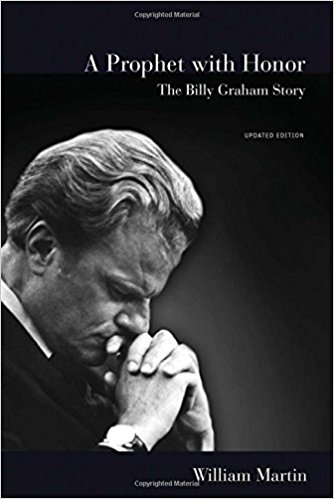Book review: A Prophet with Honor (The Billy Graham Story)
 ChatGPT
ChatGPT There is an emptiness in life without Billy Graham. So long as he lived, there was a feeling that all might still be right with the world. Well, that was my opinion, my being 78 presently and nostalgic in my old age. Even as Billy was failing in strength, he was still sharp in mind.
There is an emptiness in life without Billy Graham. So long as he lived, there was a feeling that all might still be right with the world. Well, that was my opinion, my being 78 presently and nostalgic in my old age. Even as Billy was failing in strength, he was still sharp in mind.
Shortly after his death on Feb. 21, I received a book from Zondervan titled A Prophet with Honor: The Billy Graham Story, by William Martin. In very small type on the cover was written: “updated edition”—updated meaning 2018 with a new preface for the edition. The book was first issued in 1991.
I checked with the publicist about the timing of the book. It actually was in-process of being reissued on March 6, no one expecting Billy would pass away Feb. 21. However, when he died Zondervan moved the release date to Feb. 20. So this 700-page volume has a new preface and 67 new pages at the close of the book, identified as Part 6: Finishing the Course (The Final Years). The three new chapters in that section are “The Work of an Evangelist,” “Having Faithful Children,” and “The Last Days.”
Given its 700 pages and the fact that I never read (or knew about, strangely) the 1991 first edition, perhaps my readers will allow me to share some quotes from the book and rely on the renown of the author and the fact that, says the publicity, “Graham himself requested Martin for the project and granted him unprecedented access to the Billy Graham archives and team members, lending this work the authenticity and transparency of no other.”
Over the years I have enjoyed teasing people, when the conversation turned to Graham and asking what his major course of study was at Wheaton College in Illinois. He had transferred after two years from a Bible school where he apparently fulfilled his requirements for Bible and preaching. His major at Wheaton—anthropology. Says the author: “Under the influence of an outstanding professor teaching at Wheaton between stints at the University of Pennsylvania, Billy decided to major in anthropology. Instead of leading him toward cultural relativity, with its assumption of the absence of a dependable yardstick of truth and value, the Wheaton version of anthropology provided instead a reassuring affirmation that people in every culture are essentially alike and therefore equally open to a straightforward explanation of their problem (sin and separation from the one true God) and its solution (acceptance of the saving grace made possible through Christ)” [p. 86-87].
In the new pages of the book, Martin begins by saying, “When the original edition of this book appeared, the story closed on Billy Graham’s seventy-second birthday. No other major evangelist in Christian history had enjoyed a significant ministry of comparable length, and no one would have faulted Graham had he decided to enter into quiet retirement, especially after his growing problems with trembling and weakness were diagnosed as Parkinson’s disease. But Bob Williams had been correct when he predicted, ‘He won’t stop.’ Indeed, some of the most impressive achievements of Billy Graham’s entire ministry would come during his last decades.”
Martin’s book is highly readable, and no one should feel cheated of the time it takes to complete the tome. In giving that kind of time to Graham’s biography is one way of honoring his legacy. For when it is asked who will be the next Billy Graham, we can honestly say, “there won’t be one.”
More on Book Reviews
- Book review: Building a Storybrand (by Richard Blackaby)
- Book review: He Leadeth Me (by Richard Blackaby)
- Book review: Rare Leadership: 4 Uncommon Habits for Increasing Trust, Joy, and Engagement in the People You Lead (by Richard Blackaby)
- Book review: Shaping History Through Prayer and Fasting, by Derek Prince (by Richard Blackaby)


